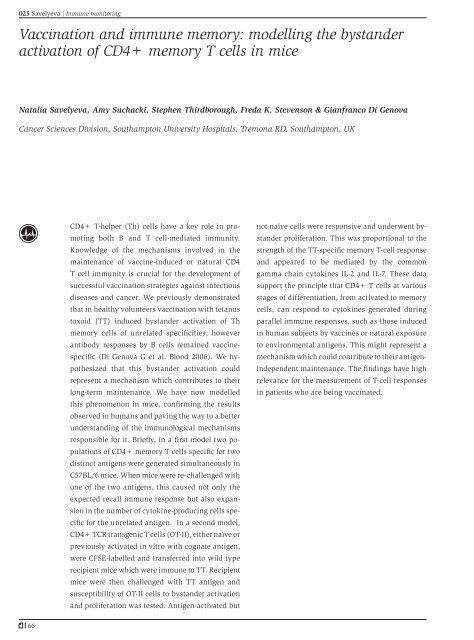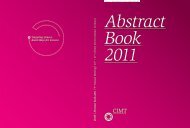Abstract Book 2010 - CIMT Annual Meeting
Abstract Book 2010 - CIMT Annual Meeting
Abstract Book 2010 - CIMT Annual Meeting
Create successful ePaper yourself
Turn your PDF publications into a flip-book with our unique Google optimized e-Paper software.
025 Savelyeva | Immune monitoring<br />
Vaccination and immune memory: modelling the bystander<br />
activation of CD4+ memory T cells in mice<br />
Natalia Savelyeva, Amy Suchacki, Stephen Thirdborough, Freda K. Stevenson & Gianfranco Di Genova<br />
Cancer Sciences Division, Southampton University Hospitals, Tremona RD, Southampton, UK<br />
66<br />
CD4+ T-helper (Th) cells have a key role in pro-<br />
moting both B and T cell-mediated immunity.<br />
Knowledge of the mechanisms involved in the<br />
maintenance of vaccine-induced or natural CD4<br />
T cell immunity is crucial for the development of<br />
successful vaccination strategies against infectious<br />
diseases and cancer. We previously demonstrated<br />
that in healthy volunteers vaccination with tetanus<br />
toxoid (TT) induced bystander activation of Th<br />
memory cells of unrelated specificities; however<br />
antibody responses by B cells remained vaccinespecific<br />
(Di Genova G et al. Blood 2006). We hypothesized<br />
that this bystander activation could<br />
represent a mechanism which contributes to their<br />
long-term maintenance. We have now modelled<br />
this phenomenon in mice, confirming the results<br />
observed in humans and paving the way to a better<br />
understanding of the immunological mechanisms<br />
responsible for it. Briefly, in a first model two populations<br />
of CD4+ memory T cells specific for two<br />
distinct antigens were generated simultaneously in<br />
C57BL/6 mice. When mice were re-challenged with<br />
one of the two antigens, this caused not only the<br />
expected recall immune response but also expansion<br />
in the number of cytokine-producing cells specific<br />
for the unrelated antigen. In a second model,<br />
CD4+ TCR transgenic T cells (OT-II), either naïve or<br />
previously activated in vitro with cognate antigen,<br />
were CFSE-labelled and transferred into wild type<br />
recipient mice which were immune to TT. Recipient<br />
mice were then challenged with TT antigen and<br />
susceptibility of OT-II cells to bystander activation<br />
and proliferation was tested. Antigen-activated but<br />
not naïve cells were responsive and underwent bystander<br />
proliferation. This was proportional to the<br />
strength of the TT-specific memory T-cell response<br />
and appeared to be mediated by the common<br />
gamma chain cytokines IL-2 and IL-7. These data<br />
support the principle that CD4+ T cells at various<br />
stages of differentiation, from activated to memory<br />
cells, can respond to cytokines generated during<br />
parallel immune responses, such as those induced<br />
in human subjects by vaccines or natural exposure<br />
to environmental antigens. This might represent a<br />
mechanism which could contribute to their antigenindependent<br />
maintenance. The findings have high<br />
relevance for the measurement of T-cell responses<br />
in patients who are being vaccinated.



